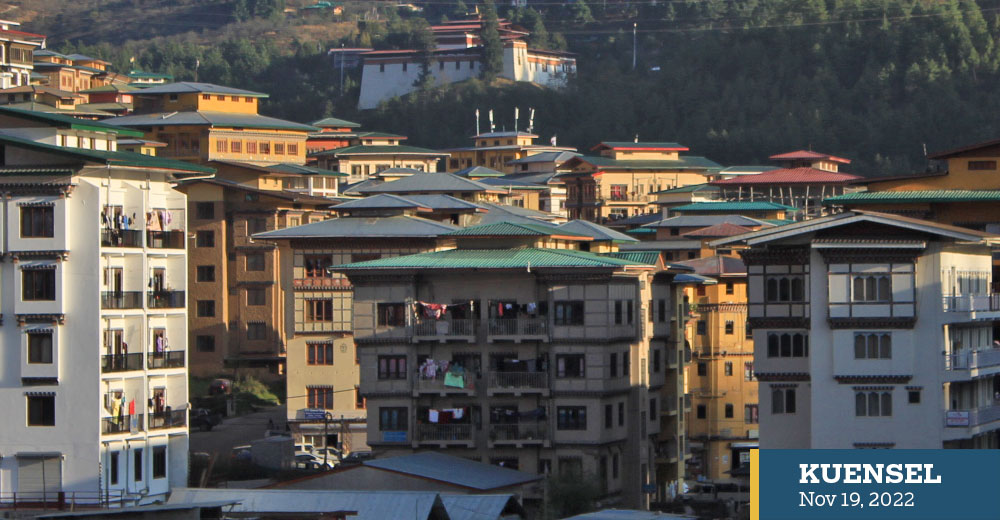…. also 15 percent as vacant land surcharge tax on the annual land tax
Thukten Zangpo
The National Assembly members supported the 0.1 percent building tax and 15 percent on land tax as vacant land surcharge during the deliberation on Property Tax Bill 2022 yesterday.
If the parliament passes the Bill, the building owners have to pay 0.1 percent of the taxable building value annually.
The tax for the building would be based on the building’s annual rental value and rates of capitalisation (expected rate of return from the property).
The members expressed the risk of a spillover effect from building tax of 0.1 percent to the tenants.
Khamaed-Lunana MP Yeshey Dem said that the already high house rents in the urban areas could further aggravate and asked the agencies concerned to strictly monitor the unethical practices. Kengkhar-Weringla MP Rinzin Jamtsho suggested reducing the building tax to 0.075 percent.
Finance Minister Namgay Tshering said that along with the increase in the house rents, building tax will increase given that tax is based on the annual capitalised value.
He added that the ministry is coming up to include deductible expenses while filing the personal income tax. The income tax Bill would be tabled during the summer session next year, Lyonpo said.
The members also expressed to provide tax rebate if there are no adequate basic amenities in the area.
Bartsham-Shongphu MP Passang Dorji said that there is a shortage of drinking water in some areas. “If there is no proper water supply, the tax has to be rebated during tax collection.”
Lyonpo Namgay Tshering said that Section 57 of the Bill will address the issue of tax if there are no adequate basic amenities.
Section 57 on remission states that the finance ministry may, on the joint recommendation of the ministry responsible for human settlement and the National Land Commission Secretariat, where it is just and equitable to do so, prescribe in the rules that the tax payable in respect of such category of land or buildings for such period shall be remitted wholly or in part, and prescribe the applicable conditions for such remission.
The members also said that the vacant land surcharge tax of 15 percent is too high and only four thromdes should be included in the surcharge.
Ten areas that fall under the surcharge tax are 10 thromdes-Thimphu, Wangduephodrang, Punakha, Trashigang, Gelephu, Samdrupjongkhar, Samtse, Phuntsholing, Mongar, and Paro town precinct.
The vacant land surcharge tax is applicable if no development has been carried out on the land within two years from the date on which all of the urban services have been made available.
Urban services include water, road, waste management and sewerage and stormwater drainage.
Opposition Leader Dorji Wangdi said that only four thromdes-Thimphu, Phuntsholing, Gelephu, and Samdrupjongkhar, which have elected Thrompons with their administration, could be included in vacant land surcharge tax.
Bartsham-Shongphu MP Passang Dorji also said that some of the thromdes do not have urban services.
Deputy Chairperson of the Legislative Committee, Karma Lhamo said that there has been a problem of housing shortage in the thromdes because of more vacant land. Because of this, she said that the implementation of the tenancy act was difficult.
Lyonchhen Dr Lotay Tshering said that some urban areas in Thimphu do not have the centralised sewerage connection, and surcharges would not be applicable to them.
He added that including six thromdes would give an opportunity for more developmental activities in these thromdes.
The deliberation on the Bill will continue on Monday.


